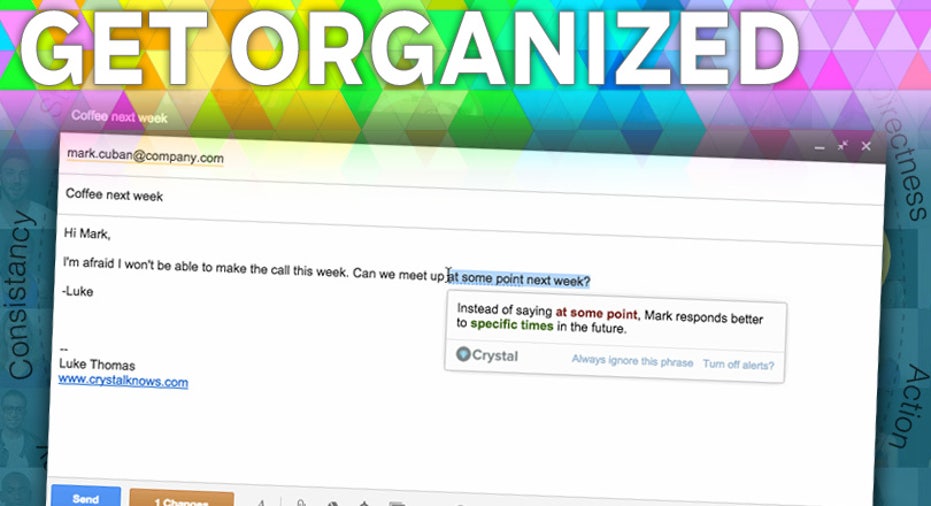Tailor Your Email to Your Receiver's Personality

Get to the point, and keep it short. That's how I want people to write when they email me. Unfortunately, that's not the advice Crystal would give. Crystal is a service that advises you on how to write email that will cater to your recipient's personality. The service initially offered bad advice about writing to me and some of its assumptions are questionable, but it still may offer real help for those who struggle with writing email.
Crystal searches the Web, including Twitter, LinkedIn, and Facebook, and analyzes the language people use to create personality profiles. When you need to email someone and want advice on the style of communication they'll be most receptive to, Crystal can give you specific advice that aims to help you tailor what you write to match the recipient's personality.
There are some obvious potential problems here. For example, some people put forward a very different online personality than their true personality. And overall, the product is a little off-putting in its smarminess. Some might find it manipulative to change their natural way of writing to better coerce someone into taking their meeting or giving them a raise.
On the other hand, so many people struggle with writing that every little bit of good advice is worth having. I was curious if Crystal might actually do some good.
Are We Who We Think We Are?I looked up Crystal's analysis of a few friends and sent them the results. One friend said her analysis was very accurate. It pegged her as someone who prefers a friendly tone and dislikes an immediate call to action. "I get real meeting anxiety and appreciate coming to a mutual agreement rather than being pressured into talking at this place on Thursday at 2 p.m. or else!"
It also told me one of my most jaded friends was "relationship-focused, expressive, and open, and prefers a predictable plan over immediate action." He said it "couldn't be more wrong," calling himself "solitary, solipsistic, anxious, and somehow capricious."
The language we use online and the personality we express online isn't necessarily reflective of our true personality in real life. Online personas might be managed by other people, or they might be designed to fit a particular image.
People don't always have a clear read of themselves, either. How we respond to different tones and language and how we think we respond are not necessarily the same. Plus, a personality analysis is loaded with identifiers, and it's awful to read them and worry that those words apply to us when we wish they didn't. It would explain why I rejected Crystal's initial analysis of me.
Crystal thought I was "people-focused: supportive and naturally empathetic with a tendency to dive into long, deep conversations instead of direct, efficient ones." One of my running jokes about my personality—and it's based on a true story—is that a parrot once read my fortune and told me I was non-judgmental and accepting of everyone; my reply was, "That parrot is a f***ing idiot."
I will gladly email someone a long, in-depth letter, but only when the context and my passion for the subject warrants it. More likely, I will trash an email without ever opening it, as I do to more than 60 percent of new messages daily. No reply means no. If that's not "efficient," I don't know what is.
After creating an account with Crystal, I had the opportunity to answer some questions about myself to get a new analysis that would inform people differently of how to interact with me. The results were completely different.
It turns out that I am "bold, pragmatic, skeptical, extremely goal-driven, and most comfortable with control." Damn right, I am!
When Any Suggestion Is Better Than NoneEnough about me. Let me share some of the suggestions Crystal provided about the language I should use to email my solipsistic friend.
Some of the suggestions sounded like things I might actually write ("How would you feel about...?") while others were so far off base from my natural tone, it might make my friend think someone had hacked my email ("Just thinking out loud...").
I'm particular about my word choices, though, and not everyone else is. For people who struggle to write, having any suggestion at all for how to start a delicate business email could be a huge help. Does it really matter if the language appeals to the recipient? Having templates that show suggestions for which words to use seems valuable for other reasons.
Crystal isn't a terrible tool, but it's probably more useful as a prompt than an adviser. In other words, its templates can help a writer avoid blank page syndrome by suggesting a starting point, but I wouldn't take its advice about tone too seriously.
The service also doesn't address the fact that people have a serious love-hate relationship with email, usually heavily skewed to the hate side. In general, it's best to write short and say what you mean. Get to the point in the first sentence. Be clear. And if you're concerned about someone misreading your tone, make sure you close with cheery sign off and an exclamation point.
Additional ResourcesFor more tips on managing your email, see these related articles:
ul.article_ul {list-style-type:disc!important;} ul.article_ul li {margin-left:30px!important; padding:0px 15px 5px 1px!important;} table.pcm_table1 {border-collapse:collapse!important; border:1px solid #CCC!important;} table.pcm_table1 td, th {border:1px solid #CCC!important; padding:3px;}
- The Best Mobile Email Client Apps
- Whip Your Inbox Into Shape With These Apps
- Stop Fighting Email With More Email
- Interview: SaneBox's Dmitri Leonov on Email Management
- 4 Ways to Combat Email Overload in the Office
This article originally appeared on PCMag.com.



















